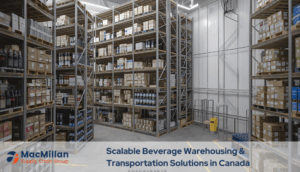Trump’s 50% Steel Tariffs: Industry Pushback and Supply Chain Disruption
Former U.S. President Donald Trump announced Trump’s 50% steel tariffs, doubling the previous 25% rate — a move that has rocked North American supply chains. Numerous industries are deeply concerned about this sharp rise, which is justified by Section 232 measures as necessary for national security. There are currently significant obstacles facing Canada’s steel industry, which exports steel products worth billions of dollars to the United States each year.
These tariffs cause a complicated web of supply chain issues for companies that operate across the Canada-U.S. border. Consumer prices could rise and economic growth could be slowed by higher material costs, possible shortages, and logistical issues. Strategic supply chain management is more important than ever as Canadian manufacturers and their American consumers scramble to adapt.
Understanding Trump’s 50% Steel Tariffs
Trade tensions between the US and its trading partners, including Canada, have significantly increased as a result of Trump’s 50% steel tariffs. The Trade Expansion Act’s Section 232 measures, which give the US the authority to defend domestic industries considered essential to national security, are the basis for these tariffs.
International partners and trade experts have criticized the national security rationale. Many contend that this line of thinking expands the meaning of security concerns to encompass economic protectionism. By raising the price of imported steel considerably, the policy seeks to support domestic steel producers in the United States.
These tariffs present immediate difficulties for Canadian companies:
-
Higher border crossing costs for steel-based materials
-
Possible supply disruptions as trade patterns change
-
Price and availability uncertainty for manufacturing inputs
-
Difficult customs procedures and extra paperwork
Businesses have limited time to modify their supply chains or look for alternate sourcing options due to the implementation timeline. The economy as a whole is impacted by this abrupt change, which forces businesses to either absorb increased costs or pass them on to customers.
How Canadian Steel Industry and Manufacturers Are Affected
The steel sector in Canada is at the forefront of this trade conflict. Canadian steel producers, a significant supplier to American markets, could suffer catastrophic repercussions. According to industry analysts, if these tariffs are maintained over time, domestic steel producers may lose billions of dollars in revenue.
A double challenge confronts Canadian manufacturers who depend on steel inputs, in addition to the steel producers themselves. As Canadian producers adjust to lost U.S. market share, domestic steel buyers may see price increases. In the meantime, possible retaliatory tariffs increase the costs for manufacturers who import specialty steel from the United States.
Among the issues facing the manufacturing sector are:
-
Reduced ability to compete with international competitors
-
Pressure to move production to avoid tariffs
-
Difficulty keeping customer prices stable
-
Difficulties with long-term planning and investment
Because they frequently lack the resources to swiftly change their supply chains or absorb large cost increases, small and medium-sized manufacturers face especially difficult obstacles. Some businesses are already delaying plans for expansion and reevaluating their cross-border business strategies, according to industry associations.
How Trump’s 50% Steel Tariffs Are Driving Up Construction and Auto Costs
Trump’s 50% steel tariffs are putting immediate pressure on the construction sector. Steel accounts for a sizeable portion of material costs in both residential and commercial construction projects. According to industry experts, steel-intensive projects may see construction costs rise by 15% to 20%, making Canada’s housing affordability crisis worse.
For Canada’s construction industry, which is already struck by high material costs and a lack of workers, the timing couldn’t be worse. Builders report:
-
Delays in projects while budgets and material sourcing are reevaluated
-
Contracts should be renegotiated to take price volatility into account
-
Accurate quotes for upcoming projects are difficult to come by
-
Project viability is a concern as costs increase
In a similar vein, the automotive industry has particular difficulties. Vehicle manufacturing depends on components that cross borders several times due to integrated supply chains that span both nations. This carefully calibrated system could be upset by the tariffs, which could result in:
-
Consumers paying more for cars
-
Assembly plant production slowdowns
-
Job losses in auto manufacturing regions
-
A quicker transition to sourcing from overseas markets
The competitive position of Canadian auto parts manufacturers, who export billions of dollars’ worth of components to American assembly plants, is now uncertain in this crucial market.
Tinplate Packaging and Consumer Goods Price Increases
Tinplate packaging is one frequently disregarded area that is experiencing major disruption. This specialty steel product is necessary for many consumer goods, including beverage containers and food canning. Packaging manufacturers must deal with significant cost increases as a result of the tariffs, which will eventually affect consumers.
Within months of going into effect, the 50% tariff could raise the cost of canned food by 8–12%, according to the Can Manufacturers Institute. Lower-income households that depend on reasonably priced canned goods would be disproportionately affected by this price inflation.
In addition to food, consumers can anticipate price increases in a variety of categories:
-
Steel-based appliances and household items
-
Costs of auto parts and repairs
-
Building supplies and home remodeling items
-
Office supplies and furnishings
At a time when many households are already experiencing financial strain, these price increases add to concerns about consumer price inflation in general. Economists caution that the tariffs might act as a regressive tax, burdening the most vulnerable.
Challenges Facing Businesses Under the New Tariff Regime
Businesses on both sides of the border face many operational difficulties as a result of Trump’s 50% steel tariffs. These issues go beyond straightforward price hikes to include serious supply chain interruptions.
Planning becomes nearly impossible due to the uncertainty surrounding the policy’s implementation. Companies struggle to decide whether to pass costs on to customers, seek alternative suppliers, or lock in current prices — all while facing delayed investment decisions and a wait-and-see mentality.
Beyond steel, the global supply chain faces ripple effects as manufacturers shift their sourcing strategies, causing potential shortages of other materials and components.
Legal complications further muddy the waters. With disputes progressing through the WTO and domestic courts, businesses must prepare for outcomes ranging from tariff reductions to retaliatory measures.
Fourth, simple substitution isn’t always feasible due to the specialized nature of many steel products. Regardless of cost, industries that demand particular steel grades or specifications might not have any other practical choices.
Finally, the cost of compliance is greatly increased by the administrative burden of handling these new tariffs. Businesses must invest in supply chain visibility, customs documentation, and trade expertise to avoid costly mistakes in this new environment.
How MacMillan Helps Businesses Navigate Trump’s 50% Steel Tariffs
We at MacMillan Supply Chain Group are aware of the intricate difficulties brought about by Trump’s 50% steel tariffs. Despite these disruptions, our all-encompassing strategy assists companies in preserving operational continuity. We’re helping our clients through these uncertain times in the following ways:
Management of Strategic Inventory
To lessen the effects of tariffs, we assist companies in putting advanced inventory strategies into practice. We can identify the ideal safety stock levels to protect against price volatility and supply interruptions by examining usage trends and lead times. For businesses wishing to secure inventory before tariffs are implemented, our network of warehouses across Canada offers flexible storage options.
We have created customized inventory management programs that strike a balance between carrying costs and tariff exposure for manufacturers who rely on steel inputs. This strategy lessens the financial impact of increased material costs while preventing production disruptions.
Alternative Solutions for Sourcing
We can find alternate sourcing options for impacted materials thanks to our wide network of suppliers. We assist customers in assessing domestic steel manufacturers who might provide competitive substitutes for imported goods. We use our international contacts to locate suppliers of specialized steel grades from nations with lower tariff rates.
In order to ensure that substitute materials satisfy quality standards and legal requirements, MacMillan’s procurement specialists collaborate with clients to qualify new suppliers. Even in the face of disruptions to traditional supply chains, this proactive approach assists businesses in maintaining production continuity.
Customs and Trade Compliance Expertise
It takes specific knowledge to navigate the complicated world of tariffs. Our trade compliance staff remains up to date on all facets of Section 232 regulations and possible exemptions. In order to guarantee accurate tariff assessment and, when necessary, spot possible exclusion requests, we assist clients in correctly classifying their products.
We offer thorough customs documentation services to companies involved in cross-border trade in order to avoid expensive delays and compliance problems. Despite the shifting regulatory landscape, our experience helps businesses avoid unforeseen fees and guarantee seamless border crossings.
Transportation Optimization
As supply chains adjust to the new tariff reality, transportation requirements often change dramatically. MacMillan’s logistics specialists redesign distribution networks to accommodate new sourcing patterns and inventory positions. We leverage our carrier relationships to secure capacity and competitive rates even as shipping patterns evolve.
We provide expedited services for shipments with a tight deadline in order to avoid production halts in the event of material shortages. As they adjust to the new trade environment, our multi-modal capabilities enable clients to strike a balance between speed and cost considerations.
Supply Chain Analytics and Visibility
Information is even more valuable during uncertain times. Real-time visibility into inventory positions, shipments in transit, and material costs is made possible by our sophisticated tracking and analytics platforms. Proactive decision-making and quick reaction to shifting circumstances are made possible by these insights.
We assist customers in putting scenario planning tools into practice that simulate different tariff outcomes and create backup plans for every scenario. This proactive strategy turns uncertainty into a controllable business variable rather than a threat.
Despite the difficulties brought on by Trump’s 50% steel tariffs, MacMillan Supply Chain Group assists companies in thriving rather than just surviving thanks to these all-inclusive solutions. Our integrated approach gives clients the resilience they need in the current unstable trade environment by addressing both short-term disruptions and long-term strategic adjustments.
Partnering with MacMillan to Tackle Trump’s 50% Steel Tariffs Effectively
A strategic approach to supply chain management is necessary to navigate the complexities of Trump’s 50% steel tariffs. Here’s how your company can put effective solutions into place and steer clear of expensive disruptions:
-
Do a thorough assessment of tariff exposure. Determine which of your components, materials, or final goods include steel that is subject to the new tariffs. Prioritize your areas of greatest risk and calculate the possible financial impact. All ensuing mitigation strategies are built upon this analysis.
-
Create a multi-sourcing plan after that to lessen reliance on any one supply channel. Think about domestic steel producers who might now be able to compete more effectively with imports that are subject to tariffs. Look into suppliers of specialized materials from nations with different tariff rates.
-
Adapt your inventory plan to your exposure to tariffs. To protect against price fluctuations and possible shortages, think about raising safety stock levels for high-risk materials. Compare the risk of production halts or emergency sourcing at premium prices with the carrying costs.
-
Examine your agreements with clients and suppliers. Negotiate price adjustment clauses that take tariff-related increases into account whenever feasible. Think about hedging techniques that offer price stability in the face of market volatility for long-term contracts.
-
Above all, collaborate with supply chain professionals who are aware of the intricacies involved in international trade. MacMillan Supply Chain Group provides the infrastructure, technology, and experience required to get through these difficult times. Our group can assist you:
-
Implement inventory strategies that balance risk and cost
-
Restructure your supply chain to reduce tariff exposure
-
Handle customs regulations and compliance issues
-
Transportation networks should be optimized to accommodate shifting supply patterns
-
Give people the visibility they need to make confident decisions
-
Avoid allowing tariff uncertainty to interfere with your company’s operations. To find out how our tailored solutions can assist your business in maintaining continuity in the face of trade challenges, get in touch with MacMillan Supply Chain Group right now. Our professionals are prepared to assess your unique circumstances and create plans that meet the demands of your supply chain and industry.
To arrange a consultation with our trade and logistics specialists, contact us by phone at (416)-941-2759 or online. By working together, we can create a supply chain that is more resilient to the trade difficulties of today and the uncertainties of the future.
Follow us on LinkedIn for real-time tariff updates
FAQS
Trump's 50% steel tariffs are import taxes that double the previous 25% rate on steel entering the United States. These tariffs apply to various steel products and are implemented under Section 232 measures of the Trade Expansion Act, which allows trade restrictions for national security reasons. The policy aims to protect domestic steel producers in the U.S. but creates significant challenges for international trade partners, including Canada.
The Canadian steel industry faces substantial challenges from these tariffs. As a major exporter to the U.S. market, Canadian steel producers may see reduced demand for their products as American buyers seek domestic alternatives to avoid the tariffs. Industry analysts project potential revenue losses in the billions, which could lead to production cuts and job losses across Canada's steel-producing regions.
Some specialized steel products may qualify for exemptions if they're not available in sufficient quantity or quality from U.S. domestic steel producers. However, the exemption process is complex, time-consuming, and offers no guarantees. Businesses must file detailed applications demonstrating why their specific steel imports cannot be sourced domestically. MacMillan Supply Chain Group can help companies navigate this exemption process.
Construction costs are expected to increase significantly due to the tariffs. Steel represents a substantial portion of materials expenses in both commercial and residential construction projects. Industry experts project cost increases of 15-20% for steel-intensive projects, which will likely worsen Canada's housing affordability crisis. Builders may need to adjust budgets, renegotiate contracts, or seek alternative materials where possible.
Retaliatory tariffs are countermeasures imposed by countries affected by another nation's trade restrictions. They typically target politically sensitive industries to create pressure for policy changes. Canada has historically responded to U.S. steel tariffs with its own tariffs on American goods. While no specific retaliatory measures have been announced for these new tariffs, many trade experts believe Canada will implement some form of response if the 50% tariffs take effect.


